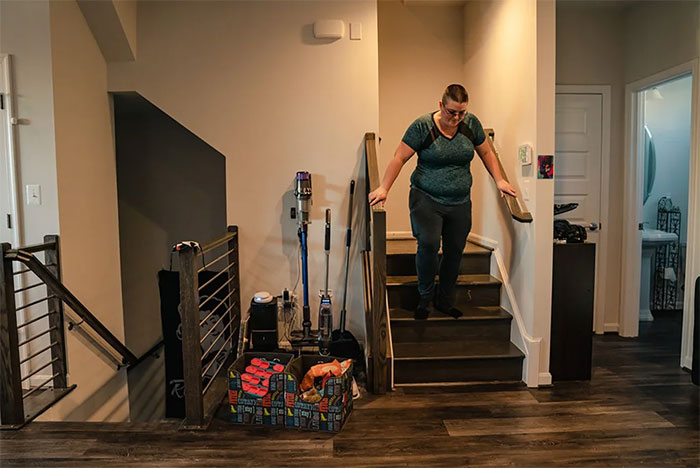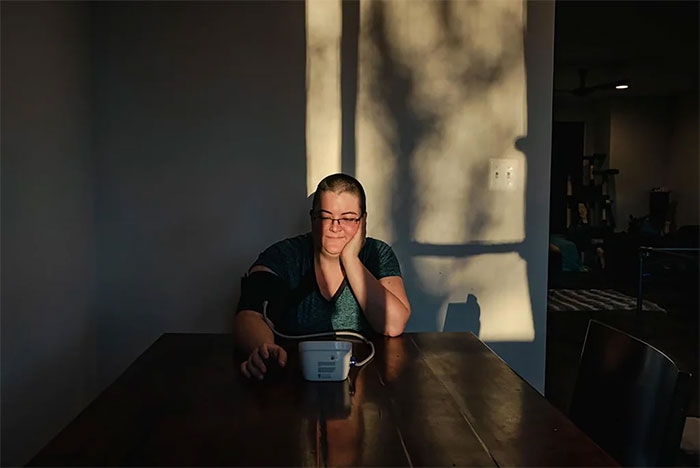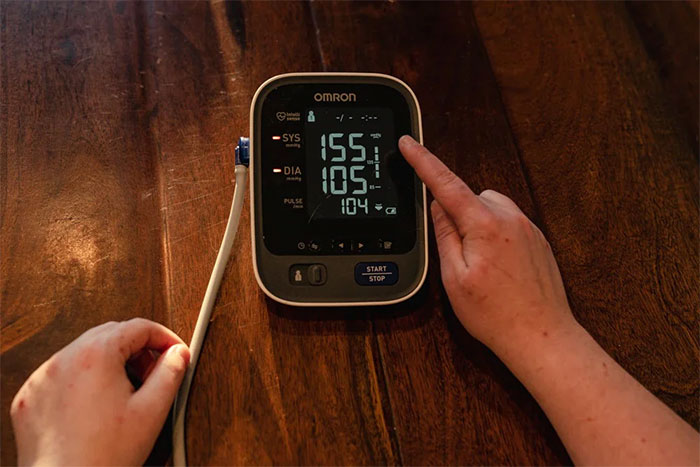After recovering from Covid-19, many individuals in the U.S. face a new, more challenging battle: unexplained mysterious symptoms.
According to a study published in Nature Medicine on February 7, conducted by a team of experts at the University of Washington School of Medicine, Covid-19 patients face a significant risk of heart disease one year after contracting the virus. This condition leads to a 4% higher rate of blood clot formation, arrhythmias, heart failure, and even stroke and death among those who have recovered from the virus.
What remains a mystery to scientists is that, similar to other post-Covid-19 symptoms, they have not identified a clear cause. Even those who were previously healthy, had mild infections, or were asymptomatic are experiencing these issues.
Heartbeats that “dance”
Five months after contracting the virus, 44-year-old Nicole Murphy from Wellsville, Ohio, frequently experiences her heart “dancing.” Normally, her heart rate is around 70 beats per minute, rising to 160 or 170 during physical activity. However, now even at rest, it spikes to 210 beats per minute, putting her at risk for heart attack, heart failure, and stroke.
This condition occurs several times an hour, leading Nicole to feel like “there’s a hamster in a wheel in my chest.”
The trouble began when the single mother and her daughter tested positive for the virus on September 5, 2021. Her daughter recovered within a few days, but Nicole fell seriously ill for about three weeks, with many symptoms that never eased.
She shared that she feels extremely weak and sometimes has memory issues. Before her illness, she worked 12 hours a day across three different jobs. Now, she can only work about 3-4 hours before needing to rest due to exhaustion.
She tries to maintain her health by walking, but often feels lightheaded and out of control. When she visited a cardiologist, Nicole fainted during a treadmill test.
“I constantly live in fear of having a heart attack or stroke,” she expressed.
No one can explain why this is happening. Nicole had never had any heart issues, her blood pressure was perfect, and there were no signs of arterial blockage; her heart was still expanding and contracting well.
Her situation mirrors that of hundreds of thousands of others who are facing similar challenges after recovering from Covid-19. Abnormal heart rhythms have become a mysterious symptom for Covid-19 survivors in the U.S., occurring weeks or months after infection, posing a risk of widespread heart crises and leaving patients in a state of constant anxiety.

Zaza Soriano takes slow steps down the stairs due to post-Covid-19 breathlessness. (Photo: Shuran Huang/Washington Post).
Similarly, Zaza Soriano, a 32-year-old software engineer from Millersville, Pennsylvania, contracted Covid-19 just before Christmas. She had received all three vaccine doses. However, post-Covid-19, her blood pressure remains unusually high, with diastolic pressure reaching 110 mmHg, significantly above the normal 80 mmHg.
Zaza also suffers from brain fog and persistent joint pain. “It’s frustrating because we know so little about the reasons behind these mysterious issues,” she lamented.
The world’s leading cause of death
Heart disease is the number one killer globally, causing 17.9 million deaths annually, accounting for one-third of all deaths before the Covid-19 pandemic. Increasing evidence highlights the significant long-term impacts of Covid-19 on health.
Many studies indicate that blood pressure among Americans has surged since the onset of the Covid-19 crisis. According to a study published in December 2021 in Circulation, the average blood pressure of half a million adults in the U.S. (monitored from April to December 2020) rose each month.
The Centers for Disease Control and Prevention (CDC) reports that over one million deaths have occurred since the Covid-19 pandemic began, surpassing previous estimations. While most of these deaths were caused directly by the virus, 30,000 fatalities were attributed to ischemic heart disease, and nearly 62,000 died from hypertension.

Cardiovascular and blood pressure issues leave Covid-19 survivors like Zaza and Nicole living in a constant state of anxiety, with no understanding of the mysterious symptoms plaguing them. (Photo: Shuran Huang/Washington Post).
When Covid-19 first struck the U.S. in 2020, doctors were surprised by its impact on cardiovascular health, as evidenced by the cases they witnessed. A professional athlete showed signs of myocarditis or heart wall thickening; another patient died from hundreds of small blood clots in vital organs; children rushed to emergency rooms with inflammatory responses related to heart complications.
Numerous studies have reached a crucial conclusion: SARS-CoV-2 can directly attack the heart and blood vessels, in addition to the lungs.
Myocarditis is mostly a transient issue, affecting function or threatening life only in a few cases; widespread clotting can often be controlled with anticoagulants; inflammatory syndromes have affected approximately 6,400 children out of millions of cases as of January.
The hypothesis that contracting the virus increases the risk of cardiovascular disease is not new. It has been observed in cases of influenza and other viruses. However, in the case of SARS-CoV-2, its impact appears to be magnified. According to cardiologist Antonio Abbate from the Pauley Heart Center, early and clear cases serve as warnings for the long-term effects we may see in the future.
As Covid-19 has become a prolonged pandemic lasting for years, those who initially had mild or even asymptomatic infections are flocking to cardiovascular clinics across the U.S.
At the Memorial Hermann-Texas Medical Center in Houston, cardiologist Abhijeet Dhoble reports an increase in cases of arrhythmias, irregular heart rhythms, and myocarditis. These patients, aged between 30 and 70, had previously contracted Covid-19, and many had no prior heart conditions.
He stated: “We are seeing similar phenomena in clinics at many universities and hospitals.”
According to David Goff, director of the National Heart, Lung, and Blood Institute, this impact may arise from two different processes. SARS-CoV-2 directly damages heart muscle cells, some of which may die, leading to a weaker heart that can no longer pump blood effectively.
The other possibility is that after causing damage to blood vessels through clotting and inflammation, the healing process stiffens blood vessels throughout the body, increasing pressure on the heart. Both processes can lead to heart failure over time.

Blood pressure and heart rate “dancing” after Covid-19 puts recovered patients at risk of serious, life-threatening diseases. (Photo: Shuran Huang/Washington Post).
According to Professor Ziyad Al-Aly from the University of Washington, the lead author of the study published in Nature Medicine, while some may think that 4% is a small number, it equates to 3 million people in the U.S. experiencing cardiovascular complications due to Covid-19 when assessing the severity of the pandemic.
“Our findings highlight the serious long-term cardiovascular consequences of contracting Covid-19 and the importance of vaccines in preventing heart damage in survivors,” Dr. Al-Aly added. He believes that U.S. and global authorities are still unprepared for what lies ahead regarding the mysterious post-Covid-19 symptoms.
Donald M. Lloyd-Jones, president of the American Heart Association, shared: “We anticipate a tidal wave of cardiovascular events in the coming years due to direct and indirect causes from survivors.”
In February 2021, the National Institutes of Health launched an initiative to examine the causes and treatments for symptoms such as phimosis, brain fog, exercise fatigue, and heart-related issues in some Covid-19 survivors. Additionally, the American College of Cardiology recognized the severe, long-term impacts of Covid-19, with new guidelines set to be published in March.
However, experts believe that more measures are needed to care for post-Covid-19 survivors, alongside a comprehensive overhaul of the healthcare system, financial support for workers, and addressing social consequences in the coming years.


















































